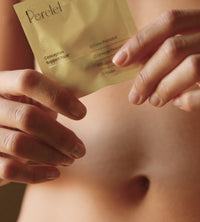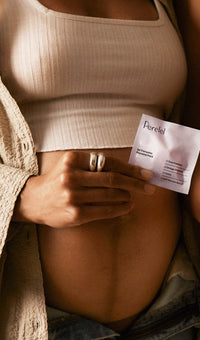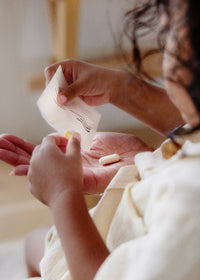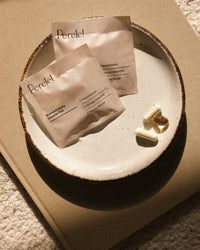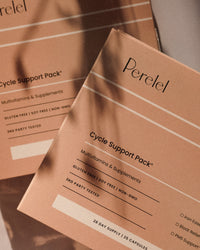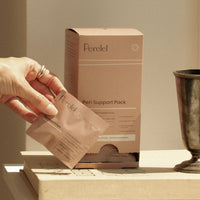Just as much as we want to nourish our little ones with the foods they eat, we also want to nourish their bodies with safe, good-for-you ingredients in our personal care and beauty products, too. And that mindfulness around ingredient safety often starts as soon as we start trying to conceive.
To weigh in on what we need to know about clean beauty for you and your baby, we tapped Dr. Sarina Elmariah, MD, PHD, Chief Scientific Officer at Evereden, our go-to beauty line for scientifically proven formulas for the whole family.
"Understanding and having confidence in the ingredients you place on your skin is just as important as understanding the food you eat and the air you breath," says Dr, Elmariah.
Continue to read her tips below.
Perelel: Why is ingredient safety important for ourselves and our children?
Dr. Sarina Elmariah: The skin functions as a first line barrier that protects you from environmental hazards, irritants, allergens and toxins. The products that we use can sometimes enhance this barrier, while in other instances they may degrade it, leading to compromised, irritated, or inflamed skin. Moreover, once applied to skin, ingredients can be absorbed by the body and may deposit into internal organs, where they may pose potential harm. We should all care about ingredient safety—regardless of our age.
P: What about during pregnancy—should we be monitoring the products that we use during pregnancy? Why so?
SE: Of course! During pregnancy, a developing child is exposed to the nutrients and chemicals absorbed by the mother, regardless of whether it is absorbed through the gut or the skin. There are cases where harmful chemicals can impact fetal development and well-being, so being cautious about what you put on your skin during pregnancy is reasonable. And, we as a field in dermatology, should encourage individuals to educate themselves about ingredients to avoid.
"The skin functions as a first line barrier that protects you from environmental hazards, irritants, allergens and toxins."
P: What are some keywords or terms consumers should look for on ingredient labels to know they are safe?
SE: If possible, it’s best to avoid products that contain fragrance, dyes, phthalates, parabens or formaldehyde. Even if something is labeled as gentle or non-toxic, it’s always best to check the ingredients yourself.
P: Many moms experience eczema with their babies who may be sensitive to certain ingredients or products. What are some of the signs your baby may be experiencing eczema and what helps to keep it at bay?
SE: Eczema can develop at a very early age and will appear as red, irritated, bumpy skin. Sometimes it can look dry and scaly, and other times it can appear crusty. In older infants, you may appreciate your baby rubbing or scratching the skin, but when they are really young, they may just seem fussy due to the itch or discomfort.
Some tips to manage eczema include keeping the skin clean, but not overbathing to avoid drying out the skin. It’s best to avoid using harsh, highly fragranced or irritating soaps or shampoos. Gentle, non-drying products without strong detergents are the way to go. Finally, hydrating the skin on a regular basis with gentle, non-fragranced emollients is helpful. If your baby’s skin continues to be inflamed, seeking medical advice from your pediatrician or dermatologist may be required.
P: A big product we should talk about is sunscreen. What should we look for in a clean sunscreen that's safe for us and our little ones?
SE: Sunscreen is helpful to protect you and your children from the damaging UV rays of the sun. Mineral sunscreens that contain zinc or titanium, particularly formulations that are determined to be "non-nano," are generally considered to be the safest bet because they are not absorbed as readily by the skin. And of course, remember to avoid unnecessary fragrance or preservatives as you would with any other skin care products.
Get more expert-backed clean living tips for busy moms + shop clean beauty products for moms and babies over at Evereden now and use code PERELEL15 for 15% off your first order.
This article is for informational purposes only. It is not, nor is it intended to be, a substitute for professional medical advice, diagnosis, or treatment and we recommend that you always consult with your healthcare provider. To the extent that this article features the advice of physicians or medical practitioners, the views expressed are the views of the cited expert and do not necessarily represent the views of Perelel.



